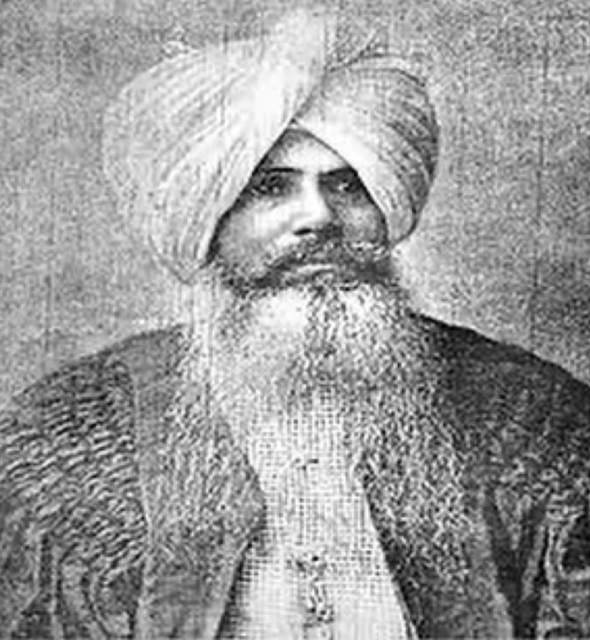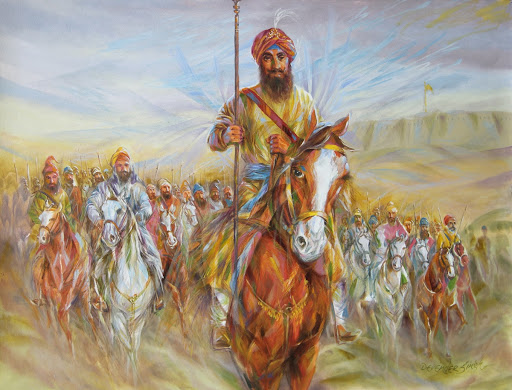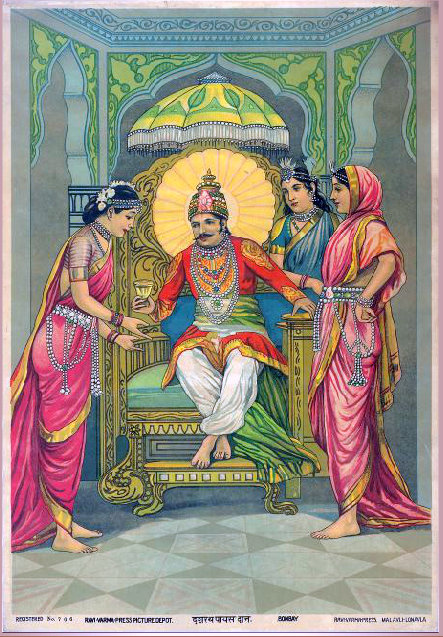DEVA SINGH, SIR (1834-1890), a highranking Patiala state administrator, was born in 1834 into an Arora Sikh family, the son of Colonel Khushal Singh, a brave soldier who had once killed a tiger (sher, in Punjabi) near one of the city gates conferring upon it the name Sheranvala which lasts to this day. Deva Singh received the only formal education available at that time by attending a maktab or Persian school, and entered Patiala state service at a very early age in 1846. In 1853, he was appointed assistant judicial minister and in 1855, a Risaldar in a cavalry unit.
DHANNA SINGH, BHAI (d. 1935), an indefatigable Sikh pilgrim, was born about 1893, the son of Sundar Singh, a ChahalJatt of the village Ghanauri in Sarigrur district of the Punjab. His original name was Lal Singh. His father died when he was barely tan years old, and he and his younger brother were brought up in the RajendraDeva Yatimkhana, an orphange in the princely city of Patiala. As he grew up, he trained as a driver and was employed in the state garage of Maharaja Bhupinder Singh (1891-1938).
DHERA SINGH, BHAI (1890-1921), was born on 29 August 1890, the son of Bhai Jaimal Singh and Mai Jivan Kaur, a peasant couple of Pandori NiJjarari, in Jalandhar district. On the opening of the Lower Chenab Canal Colony in West Punjab, the family settled in Chakk No. 91 Dhannuana in Lyallpur district. Dhera Singh, though illiterate, was an anointed Singh. He never married and led a simple life of honest hard labour until his martyrdom as a member of the jatha that was massacred in the walled compound of Gurdwara Janam Asthan at Nankana Sahib on the morning of 20 February 1921. See NANKANA SAHIB MASSACRE
DIAL DAS, BHAI or Bhai Diala (d. 1675), martyr to the Sikh faith, was, according to Shahid Bilas Bhai Mani Singh, the son of Mai Das and an elder brother of Bhai Mani Ram. He was a prominent Sikh of his time and was in the train of Guru Tegh Bahadur during his journey across the eastern parts in 1665-70. He was one of the Sikhs detained and later released by the Mughal rulers in 1665. As the Guru proceeded further east from Patna, Dial Das was left behind to look after the Guru`s family.

DITT SINGH, GIANI (1853-1901), scholar, poet and journalist, was an eminent Singh Sabha reformer and editor. He was born on 21 April 1853 at Kalaur, a village in Patiala district of the Punjab. His ancestral village was Jhalliari, near Chamkaur Sahib, but his father, Divan Singh, had migrated to his wife`s village, Kalaur. Divan Singh, a Ravidasia by caste and a weaver by trade, was a religious minded person who had earned the title of Sant for his piety.
DASAUNDHA SINGH (d. 1767), founder of the Nishanavali misl, was the son of Chaudhari Sahib Rai belonging to the village of Mansur, in Firozpur district of the Punjab. He received pahul, the Khalsa initiatory rites at the hands of Diwan Darbara Singh, a prominent Sikh leader of the post Banda Singh period. By 1734, Dasaundha Singh was a leading figure in the Taruna Dal. At the time of the formation of the Dal Khalsa in 1748, he was proclaimed the leader of the Nishanavali misl.
DALLA, BHAI (later Dall Singh), a Siddhu Jatt and chaudhari or landlord of Talvandi Sabo, enthusiastically received Guru Gobind Singh when he arrived there with his entourage early in 1706, and attended diligently to the needs and comforts of the daily growing sangat. According to Bhai Santokh Singh, Sn Gur Pratap Suraj Granth, Dalla maintained a private army of several hundred warriors of whom he was very proud. He more than once commiserated with Guru Gobind Singh on the events that had overtaken him, boastfully adding that had the Guru called him for help he would have joined him with his bold warriors and that he (the Guru) would have been saved much of the travail. Guru Gobind Singh every time dismissed the topic saying, "God`s will must prevail. It is useless to brood over the past. "
DARGAHA SINGH, BHAI (1713-1823), a Nirmala saint, was born in 1713 the son of Bhai Nigahia Singh of the village of Laungoval, in present day Sangrur district of the Punjab. Nigahia Singh was known to be the elder brother of Bhai Mani Singh, the martyr. For the divali festival of 1725, Nigahia Singh along with his seven sons went to Amritsar where the whole family received the initiatory rites of the Khalsa at the hands of Bhai Mani Singh. Three of the brothers remained in Amritsar, among them Dargaha Singh who showed marked aptitude for scholarly learning as well as for the martial arts. He gained proficiency in both fields, though he was more inclined towards religious pursuits.





